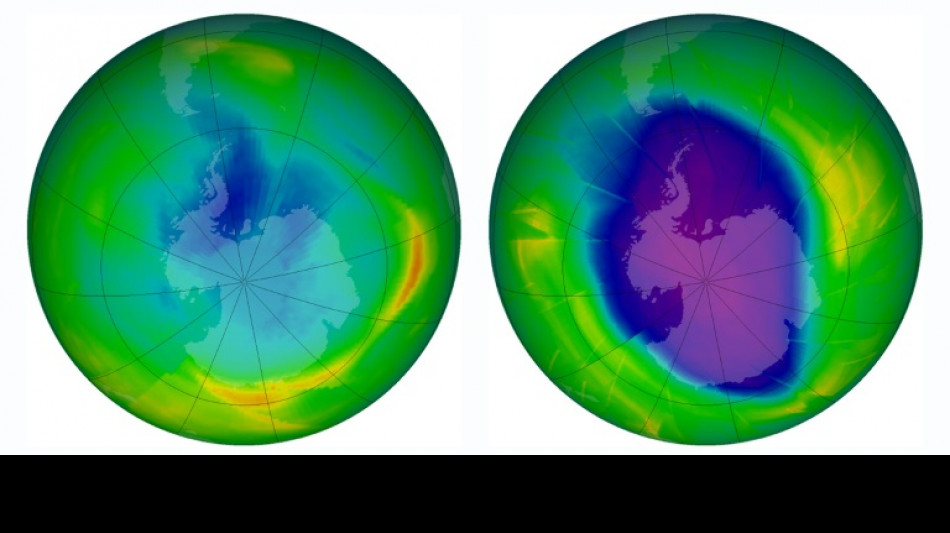
-
 Shark bites surfer in Australian state's fourth attack in 48 hours
Shark bites surfer in Australian state's fourth attack in 48 hours
-
North Korea's Kim sacks vice premier, rails against 'incompetence'
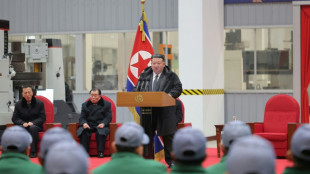
-
 Spain mourns as train crash toll rises to 40
Spain mourns as train crash toll rises to 40
-
'Very nervous' Keys makes shaky start to Australian Open title defence

-
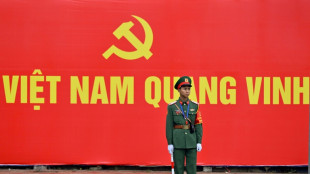 Vietnam leader promises graft fight as he eyes China-style powers
Vietnam leader promises graft fight as he eyes China-style powers
-
Dad-to-be Ruud ready to walk away from Australian Open

-
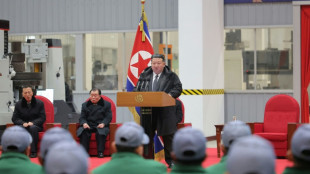 North Korea's Kim sacks senior official, slams 'incompetence'
North Korea's Kim sacks senior official, slams 'incompetence'
-
Farewells, fresh faces at Men's Fashion Week in Paris

-
 'I do not want to reconcile with my family' says Brooklyn Peltz Beckham
'I do not want to reconcile with my family' says Brooklyn Peltz Beckham
-
EU leaders take stage in Davos as Trump rocks global order
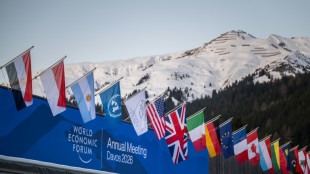
-
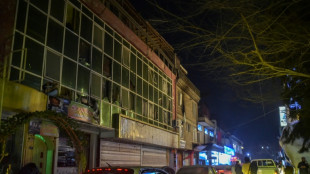 Blast at Chinese restaurant in Kabul kills 7
Blast at Chinese restaurant in Kabul kills 7
-
Warner hits 'Sinners' and 'One Battle' tipped for Oscar nominations

-
 Colombian paramilitary-turned-peace-envoy sentenced over atrocities
Colombian paramilitary-turned-peace-envoy sentenced over atrocities
-
Gilgeous-Alexander leads Thunder in rout of Cavaliers

-
 Seahawks blow as Charbonnet ruled out for rest of season
Seahawks blow as Charbonnet ruled out for rest of season
-
Kostoulas stunner rescues Brighton draw after penalty row

-
 Man Utd greats tell Martinez to 'grow up' as feud rumbles on
Man Utd greats tell Martinez to 'grow up' as feud rumbles on
-
LeBron James' All-Star streak over as starters named

-
 Allies tepid on Trump 'peace board' with $1bn permanent member fee
Allies tepid on Trump 'peace board' with $1bn permanent member fee
-
Ninth policeman dies in Guatemala gang riots, attacks

-
 Man City's Foden to play through pain of broken hand
Man City's Foden to play through pain of broken hand
-
Milan Fashion Week showcases precision in uncertain times

-
 Public media in Europe under unprecedented strain
Public media in Europe under unprecedented strain
-
Africa Cup of Nations refereeing gets a red card

-
 Tributes pour in after death of Italian designer Valentino
Tributes pour in after death of Italian designer Valentino
-
Bills fire coach McDermott after playoff exit: team

-
 Chile wildfires rage for third day, entire towns wiped out
Chile wildfires rage for third day, entire towns wiped out
-
Valentino, Italy's fashion king who pursued beauty at every turn, dies at 93

-
 France PM to force budget into law, concedes 'partial failure'
France PM to force budget into law, concedes 'partial failure'
-
Allies tepid on Trump 'peace board' with $1bln permanent member fee

-
 'My soul is aching,' says Diaz after AFCON penalty miss
'My soul is aching,' says Diaz after AFCON penalty miss
-
Ex-OPEC president in UK court ahead of corruption trial

-
 Iran warns protesters who joined 'riots' to surrender
Iran warns protesters who joined 'riots' to surrender
-
Stop 'appeasing' bully Trump, Amnesty chief tells Europe

-
 Central African Republic top court says Touadera won 78% of vote
Central African Republic top court says Touadera won 78% of vote
-
Trump tariff threat has global investors running for cover

-
 Spectacular ice blocks clog up Germany's Elbe river
Spectacular ice blocks clog up Germany's Elbe river
-
Trump says not thinking 'purely of peace' in Greenland push

-
 Syria's Kurds feel disappointed, abandoned by US after Damascus deal
Syria's Kurds feel disappointed, abandoned by US after Damascus deal
-
Man City sign Palace defender Guehi

-
 Under-fire Frank claims backing of Spurs hierarchy
Under-fire Frank claims backing of Spurs hierarchy
-
Prince Harry, Elton John 'violated' by UK media's alleged intrusion

-
 Syria offensive leaves Turkey's Kurds on edge
Syria offensive leaves Turkey's Kurds on edge
-
Man City announce signing of defender Guehi

-
 Ivory Coast faces unusual pile-up of cocoa at export hubs
Ivory Coast faces unusual pile-up of cocoa at export hubs
-
Senegal 'unsporting' but better in AFCON final, say Morocco media

-
 New charges against son of Norway princess
New charges against son of Norway princess
-
What is Trump's 'Board of Peace'?

-
 Mbappe calls out Madrid fans after Vinicius jeered
Mbappe calls out Madrid fans after Vinicius jeered
-
Russians agree to sell sanctioned Serbian oil firm


Ozone layer healing but imperiled by schemes to curb Sun's heat
The ozone layer that shields life on Earth from deadly solar radiation is on track to recover within decades, but controversial geoengineering schemes to blunt global warming could reverse that progress, a major scientific assessment warned Monday.
Since the mid-1970s, certain industrial aerosols have led to the depletion of ozone in the stratosphere, 11 to 40 kilometres (7 to 25 miles) above Earth's surface.
In 1987, nearly 200 nations agreed on the Montreal Protocol to reverse damage to the ozone layer by banning chemicals that destroy this naturally occurring stratum of molecules in the atmosphere.
That agreement is working as hoped, and is in line with previous projections, more than 200 scientists found.
"Ozone is recovering, this is a good story," John Pyle, a professor at the University of Cambridge and co-chair of Scientific Assessment of Ozone Depletion, told AFP.
The ozone layer should be restored -- both in area and depth -- by around 2066 over the Antarctic region, where ozone depletion has been most pronounced, according to the report, jointly released by the World Meteorological Organization (WMO), the UN Environment Programme, and government agencies in the US and the European Union.
Over the Arctic, full recovery will happen around 2045, and for the rest of the world in about 20 years.
An intact ozone layer filters out most of the Sun's short-wave ultraviolet radiation, which damages DNA in living organisms and can cause cancer.
At ground level, however, ozone is a major component of air pollution and exacerbates respiratory disease.
Efforts to repair the ozone layer intersect with the fight against global warming.
- Like a volcano -
The phase-out of ozone-depleting substances -- some of them powerful greenhouse gases -- will have avoided up to one degree Celsius of warming by mid-century compared to a scenario in which their use expanded some three percent per year, according to the assessment.
A class of industrial aerosols developed to replace those banned by the Montreal Protocol also turned out to be powerful greenhouse gases, and will be phased out over the next three decades under a recent amendment to the 1987 treaty.
But while the world pulled together to tackle the damage to the ozone layer, it has failed to curb carbon emissions quickly enough to forestall dangerous warming.
A world barely 1.2C above pre-industrial levels has already been buffeted by record heatwaves, droughts and temperatures, and is headed for a disastrous 2.7C above that benchmark.
With emissions continuing to rise and time running out to avoid some of the worst impacts, controversial geoengineering schemes are moving to the centre of climate change policy debates.
These include proposals to blunt global warming by depositing sulphur particles into the upper atmosphere.
But the report cautioned this could sharply reverse the recovery of the ozone layer.
So-called stratospheric aerosol injection (SAI) is increasingly seen as a potential stop-gap measure for capping temperatures long enough to tackle the problem at the source.
Nature demonstrates that it works: the violent 1991 eruption of Mount Pinatubo in the Philippines -- which spewed millions of tonnes of dust and debris -- lowered global temperatures for about a year.
- Unintended consequences -
Scientists calculate that injecting 8 to 16 million tonnes of sulphur dioxide into the stratosphere each year, roughly equivalent to Pinatubo's output, would cool Earth's temperature by about 1C.
Simulations over Antarctica in October -- when the ozone hole is biggest -- show that so-called stratospheric aerosol injection over 20 years would lower global temperatures by 0.5C.
But there's a trade-off: the ozone layer would be reduced to its 1990 levels, only a third of what it was before the impact of human activity.
The world would see "a continuing severe depletion of ozone while such solar radiation management continues," Pyle said.
The UN's climate science advisory panel, the IPCC, has warned of other unintended consequences, ranging from the disruption of African and Asian monsoons, upon which hundreds of millions depend for food, to a drying of the Amazon, which is already transitioning toward a savannah state.
The new report, the 10th to date, also highlights an unexpected decline of ozone in the lower stratosphere over the planet's populated tropical and mid-latitude regions.
Up to now, chlorofluorocarbons, or CFCs, and other molecules have mainly eroded ozone in the upper stratosphere, and over the poles.
Scientists are investigating two possible culprits: industrial chemicals not covered by the Montreal Protocol called "very short-lived substances" (VSLSs), and climate change.
S.Keller--BTB



